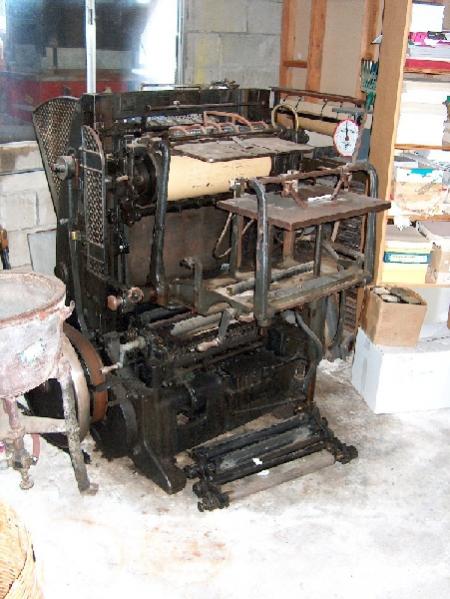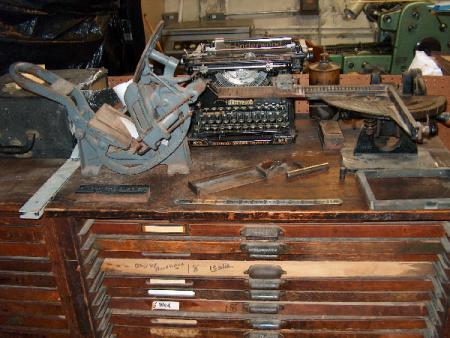Packing up dad’s shop
Packing up dad’s shop
I walked into the crowded basement past old beds, boxes, furniture, photo albums, and other odds and ends, residue of my parents’ lives. This is the basement of the house where they lived for 25 years. This is the house where my mom made holiday dinners and my dad plied his trade as the country printer. They’re both gone now. Dad died in 1993, and mom in 2005.
Upstairs, the house is rented to strangers. We have kept the basement for storage because we haven’t been ready so far to face the emotions and the drudgery of sorting through everything and sending it on to its next destination.
I twisted my torso to get through a doorway partially blocked by my nephew’s couch, squeezed in, standing on its end. He stored it here when he moved to San Francisco. Once through the doorway, I was in the print shop. I paused to look around.
This was my dad’s shop. He was a printer from about age ten until the day he died. He taught me the trade starting when I was a boy just old enough to hold a broom. “I’m going to teach you the trade,” my dad told me, and I felt proud. Mom said “I think he’ll go to college. He’ll probably have a different kind of career.” “That’s all right,” Dad said, “I’ll still teach him the trade because he needs a craft he can fall back on.” I did go to college and I did have a different career, several of them, but I also fell back on the printing trade. It helped me support my family for many years.
As I looked around, what I saw was a letterpress print shop. No computers here. From around 1900 to around 1950, this is what many small print shops in America looked like. I saw the familiar slug rack and went over and picked up a 15-pica slug. A slug in a print shop like this is a piece of soft metal, (lead, antimony, and tin), that is six points (about 1/16th of an inch) thick. This one was 15 picas long. A pica is pretty close to 1/6 of an inch. Slugs are used as spacers between lines of type. The columns in many newspapers and periodicals are 15 picas wide, so I have handled many 15-pica slugs in my time. I looked at it and turned it over in my fingers. There was something different about it today. It had taken on a kind of luminescent beauty, but the life had gone out of it.
For hundreds of years printing has been done by a process that includes type, ink, paper, and pressure that pushes the paper firmly against the inked type. Each piece of type has at its top the form, in relief, of a letter, number, or punctuation mark. Printing is no longer done this way, except by a small number of artists and craftspeople.
I put down the 15-pica slug while my eyes surveyed the work area. The remains of several of my projects lay in various levels of disarray. The type for my nephew’s business card was there as were remnants of my daughter’s engagement announcement. By all rights these letters, spaces, and designs should have been returned to their cases and racks long ago. The way I was taught, you always return the type to its case as soon as the job is printed. I’m afraid I’m a few years behind.
The type was also there of one of my favorite quotes. It’s from the Zen master Thich Nhat Hanh:
Breathing in, I calm my body.
Breathing out, I smile.
Dwelling in this present moment,
I know this is a wonderful moment.
I printed and framed this quote for friends a few years ago. My conscience reminded me that this type too should have been returned to its case.
Here in the print shop I was in a setting from my past. It had its own vocabulary: words like type, slugs, leads, type sticks, typewriters, line gauges, pigs, and presses.
After another moment of reverie I knew just what I had to do. Years of practice had taught me to clean the area and start putting each thing, one at a time, back in its place, the slugs in their rack, segregated by length, the type back in its proper case, by style and size.
I’ve cleaned the print shop many times, washed the ink off the type and put it away, cleaned and oiled the press, and put on new tympan paper. But as I cleaned today I knew something was different. I wasn’t getting things clean and ready for the next job. After many decades I was putting the type away for good. The type and presses are going to be sold or given away. This print shop will be no more.
Leaving the print shop, twisting my body past the couch on its end, it occurred to me that sometime in the future I may come across a really good quote that I will want to share with friends, and I might think how handsome it would look printed, really printed, with fine paper pressed against inked metal type. So maybe I’ll keep just one small press and a few cases of type, because I think there’s a place, deep inside, where I’m still what my dad taught me to be — a printer.

Vertical pretty good 2.jpg

Shop odds ends lores.jpg
Thank you for sharing that with us. I learned the trade from my dad also.
You can be assured of my thoughts and prayers during this time of transition for you. You will need it.
~Bill Cook
Maybe you should keep all of it.
Hi Bill,
Thanks for the kind words. If I had a place for it, I think I would keep it all; it’s very tempting.
Jim
Your nostalgic piece was a tribute to your father.
If I remember correctly, he cast and sold type. He said it was “Good type in any case”.
inky
I quote Bill Cook: “Maybe you should keep it all.”. As a comment for your father I can quote a famous song:
“In heaven there is no beer
that’s why we drink it here
and when we are gone from here
our friends will be drinking all of our beer …”
Cheers for you Dad
André
Thanks, much, Jim.
Your essay brought to mind for me all those
old guys who, years ago, took the time
to share their craft with me.
Tricks, tips, habits, standards, enthusiasm—
my life would be no where near as rich if it
weren’t for all those guys (and at least one
remarkable long-gone gal)
Calvert Guthrie
Ragpicker Press
KC Center for the Ink & Paper Arts
What a lovely story.
Perhaps one thought would be to give/sell some of those wonderful items to a school or book arts center. As someone who learned to print from such a place, it was only because of the wonderful donations from printers past that a new generation of printers could learn such a wonderful artform. I was lucky to have a huge room full of type -wood and lead- to look over and would spend hours setting my type.
You wouldn’t just be passing on his type, his presses, his tools, but also his legacy.
That was very nice.
This is a very special tribute. I too, am in the process of closing down my father’s shop. He passed away last month & I know printing was not only a second job for him, but an enjoyable hobby as well. He learned as a child during the depression to print & it carried him into his adulthood. Before he died he commented on how sad he was to know that his presses would be sold. I just hope I can find someone to buy his shop pieces that I know will treasure them as much as he did.
Thank you for sharing your experience, your emotions, and your history.
My grandfather was a journalist and longtime hobby pressman who passed away a few months ago. (If my user icon shows up correctly, that’s him.) When my sister and I were tiny he held us up to a little handpress to help him make business cards. He had to sell off most of his personal printing equipment towards the end of his life but I believe the handpress is still there. My mom is living in his old house now; I think I will ask her about it.
Such a touching story. When my dad died the only things I wanted to keep were his woodworking tools, the things I watched him use day after day in his basement shop. It’s weird but when I use them myself I feel closer to him than I did when he was alive.
Here’s a thought: why not give some of your dad’s things to new printers with the condition that they use them to print something and send you a copy, along with a brief description of how they got interested in printing. Then you could put together a nice portfolio for the family archives that would embody your dad’s legacy to a new generation of printers.
Barbara